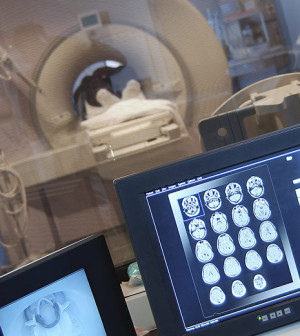- FDA Approves New Antibiotic Against UTIs
- New School Lunch Rules Target Added Sugars, Salt
- Dairy Cows Moved Across State Lines Must Now Be Tested for Bird Flu
- TikTok Riddled With Misleading Info on Health: Study
- Emulsifier Chemicals Are Everywhere in Foods. Could They Raise Diabetes Risk?
- Opioids During Pregnancy May Not Raise Psychiatric Risks for Offspring
- Could Heartburn Meds Raise Your Migraine Risk?
- Drug, Alcohol Abuse Goes Untreated in Many Ex-Prisoners
- Watchdog Group Says U.S. Food Recalls Rose Again Last Year
- Genes Could Mix With Pesticide Exposure to Raise Parkinson’s Risk
Health Highlights: Oct. 17, 2016

Here are some of the latest health and medical news developments, compiled by the editors of HealthDay:
Male Breast Cancer Survivors Speak Out
October is Breast Cancer Awareness Month, but male survivors of the disease say they’re often overlooked.
“October should not be 100 percent pink. I’m trying to put a splash of blue in there,” Michael Singer, a 56-year-old breast cancer survivor in the Bronx who is promoting Male Breast Cancer Awareness Week Oct. 16-22, told the New York Daily News.
Stephen Cone is a 66-year-old resident of Washington, D.C. who has battled breast cancer twice and feels excluded.
“It’s like we’re totally invisible,” he told the Daily News. “Men [with breast cancer] are never mentioned by the NFL. We’re not mentioned by Susan Komen. We’re definitely not on the radar.”
Breast cancer occurs about 100 times less often in men than women, but about 2,600 men in the U.S. will be diagnosed with invasive breast cancer this year, and 440 will die of the disease, according to the American Cancer Society.
Unlike women, men haven’t been educated about breast cancer detection so the disease is often found at a later stage, which leads to a lower survival rate among male breast cancer patients.
“There is this myth that men can’t get it, so that leads to lumps and masses being ignored, and treatment and diagnosis is delayed, Dr. Paula Klein, an oncologist at Mount Sinai Beth Israel, told the Daily News.
Men with breast cancer also have more difficultly finding support and face higher levels of stigma than women.
“Men, if you do get diagnosed with this, you are not alone,” said Singer, who advocates for the American Cancer Society and the Male Breast Cancer Alliance, the Daily News reported. “You have that loneliness, and all of the fear and emotions running through you, but there are other men out there you can reach out and talk to.”
Copyright © 2024 HealthDay. All rights reserved.










